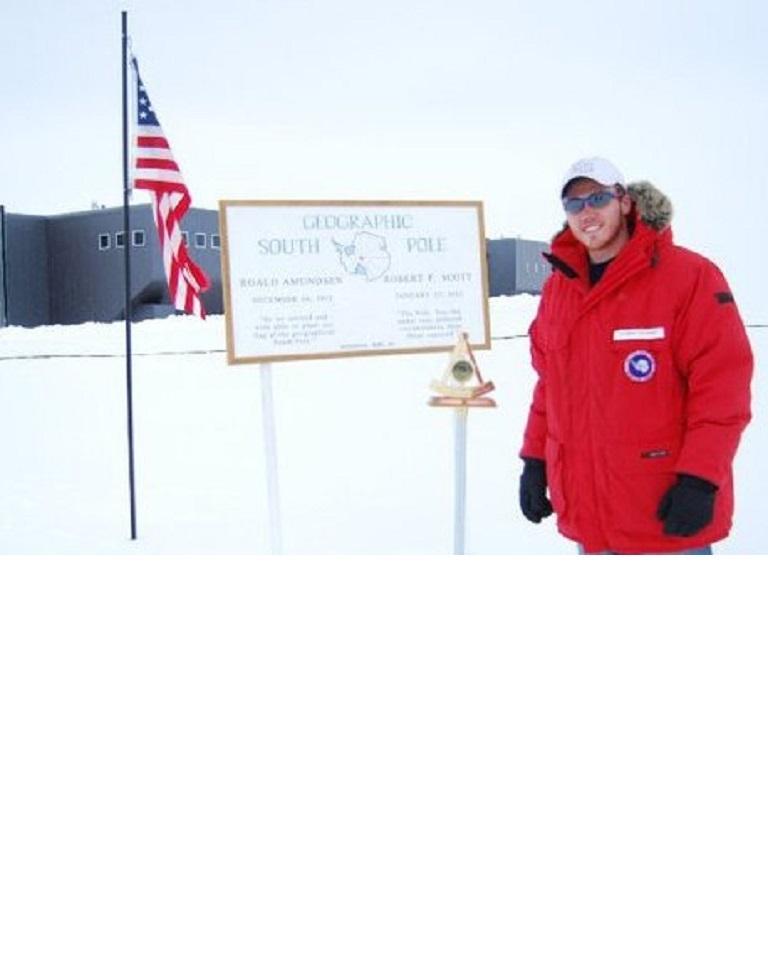Andrew Wendorff

ALUMNI SPOTLIGHT | MARCH 2015
KU major: Aerospace Engineering; Class of 2011
Current occupation: PhD Candidate at Stanford University
Research Mentors: Dave Besson and Kenneth Ratzlaff
Q: Describe the undergraduate research/creative experience that you had while at KU:
A: As an undergrad, I worked to develop an alternative power system for a high energy particle physics experiment, known as the Askaryan Radio Array, at the geographic South Pole. As part of the work, I created a combined power system consisting of wind, solar, and battery components that was deemed as the most likely candidate to fulfill the mission. Three wind turbines were chosen as potential wind power sources and, after modifications for extreme cold were made, they were installed at the South Pole in January 2011.
Q: What do you think was the most important thing you learned while doing undergraduate research?
A: While working on a project over multiple years, I gained the insight into how the academic world approaches problems. Unlike problem sets that are due every week or projects that might take a couple of months at most, fundamental research takes a significant amount of time to first become up to date in the literature and what is state of the art and then additional months to years are spent trying many different potential solutions before one is actually found.
Q: What advice do you have for undergraduates who might be interested in doing research or creative scholarship?
A: I would say to find an area where the individual is interested and start cultivating a relationship with faculty in the discipline. Show enthusiasm for the subject, take initiative, and ask as many questions as possible.
Q: Do you use any of the skills or perspectives gained doing research in your current occupation? How so?
A: As a graduate student, the work I do now is not directly related to the subject I worked on as an undergraduate. The lessons of finding a project that is fun and interesting have helped me throughout my studies. Collaborating in a group of highly intelligent and motivated individuals pushed me to understand all the different aspects of my work so I could successfully outline the benefits and address potential weaknesses.
Q: Many undergraduate researchers are making decisions about what to do after they graduate from KU. Having been in those shoes, what do you know now that you wish you’d known then? Do you have any advice?
A: Use undergraduate research as a way to explore a potential field that you are interested in, especially if classes are not offered in that area or you want to delve further. Are you naturally curious and always asking questions? If so, graduate school and potentially a PhD would be a good path to follow. Also, take chances on an opportunity that is outside of your comfort zone in your career or in your personal life. When determining your career plan, whether that is applying for jobs or dealing with graduate school admissions, be honest and tell your actual feelings, not just want you think the individual wants to hear, because that person then has the opportunity to help you meet your goals. No matter what you do, be confident in your accomplishments and knowledge you've obtain, but also acknowledge what you do not know. If you find an area that you are not familiar with, but find fascinating, ask people how they got started in the field or for an introduction. It's okay to not know everything on the first day, whether it's in a job or in graduate school. Just be eager to learn and try your best.